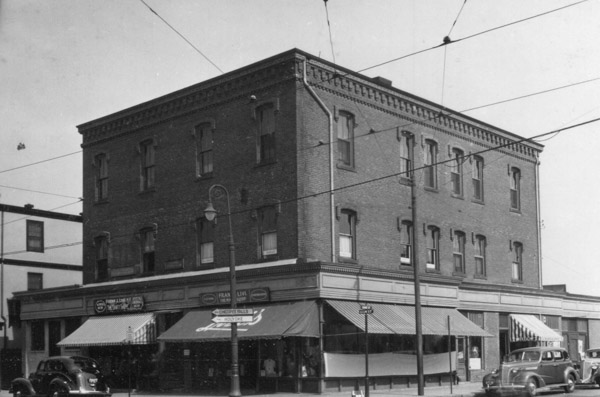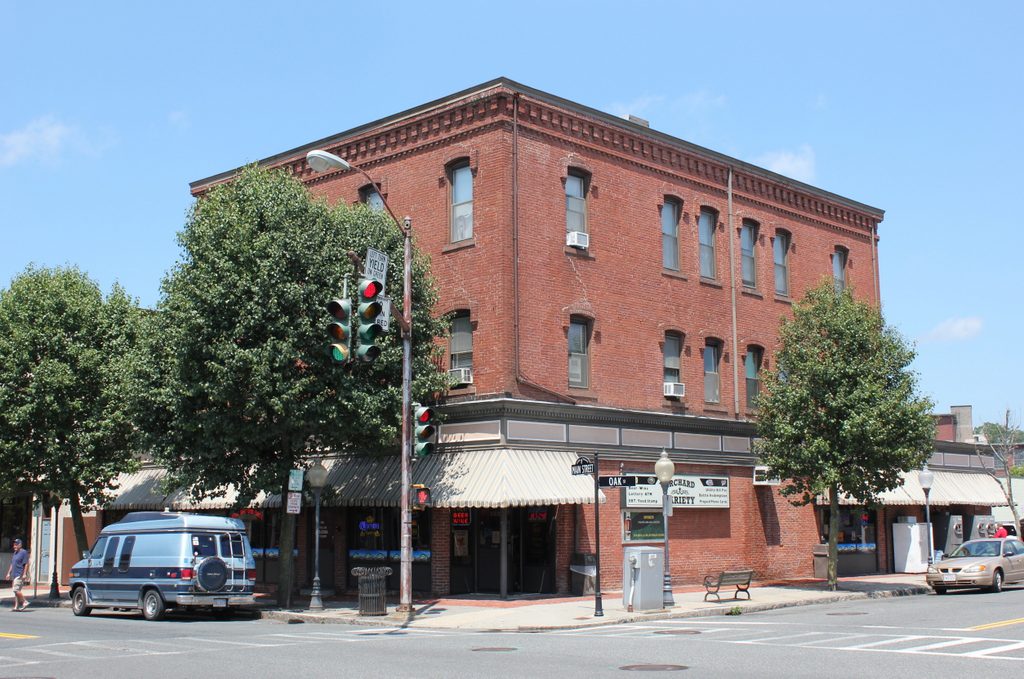The commercial block at the corner of Main and Oak Streets in the Indian Orchard neighborhood of Springfield, around 1938-1939. Image courtesy of the Springfield Preservation Trust.
The scene in 2017:
The neighborhood of Indian Orchard is located in the northeastern corner of Springfield, about five miles from the city center, and during the mid-19th century it developed into a small factory village along the Chicopee River. In part because of this distance, Indian Orchard’s growth was largely independent from the rest of Springfield, and came to include a small downtown area, with its own Main Street that was lined with brick commercial blocks. Among these was this three-story, Italianate-style building at the corner of Oak Street. Built in 1875, it was located at one of the busiest intersections in the neighborhood, and included stores on the first floor, plus offices and a public hall on the upper floors.
The building was originally owned by businessmen Henry K. Wight and George H. Chapman, who each had stores on the ground floor. Wight was a partner in Wight, Rivers & Co., a grocery store that occupied the corner storefront, and city directories of the era describe the company as “Dealers in Choice Groceries, Crockery and Glass Ware, Flour, Teas, Coffees, Sugars, Butter, Cheese, Syrup and Molasses. All varieties of Canned Fruits, with a complete assortment of goods usually kept in a first-class store. Also Dealers in Paints, Oils, Window Glass, etc.” Next to this store, on the left side of the building, was Chapman & Bengle, “Dealers in Clothing, Gentlemen’s Furnishing Goods, Boots and Shoes. Repairing neatly and promptly done.”
George Chapman’s business partner, Charles Bengle, purchased Chapman’s interest in the company in 1886, and he remained in business in this building until 1905, when he built a new commercial block, directly across Oak Street from here, and moved his store into the new building. Then, around 1910, the older Wight & Chapman Block was purchased by Charles Rieutord, the proprietor of the nearby National House hotel on Oak Street. Upon purchasing this building, he set about renovating it, including extending the storefronts along both the Main Street and Oak Street sides.
Rieutord opened a wholesale liquor store on the left side of the ground floor, and ran it for about a decade, until Prohibition was enacted in 1920. Along with this, he was also involved with the Springfield Breweries Company, which attempted to adapt to Prohibition by producing non-alcoholic beverages. By the mid-1920s, he was the company’s vice president, serving under president Theodor Geisel – the father of Dr. Seuss – but the brewery ultimately went out of business before the end of Prohibition.
By the time the first photo was taken in the late 1930s, the building’s retail tenants included Frank J. Livi, an Italian immigrant who ran a clothing shop in the corner storefront. The store would remain here until at least the 1960s, and since then the exterior of the building has remained well-preserved. Indian Orchard still retains much of its historic appearance, and still bears closer resemblance to a small mill town rather than a neighborhood of a large city. The Wight & Chapman Block is one of many historic buildings along this section of Main Street, and today it stands as one of the finest commercial buildings of its era, not just in Indian Orchard but in the entire city of Springfield.


